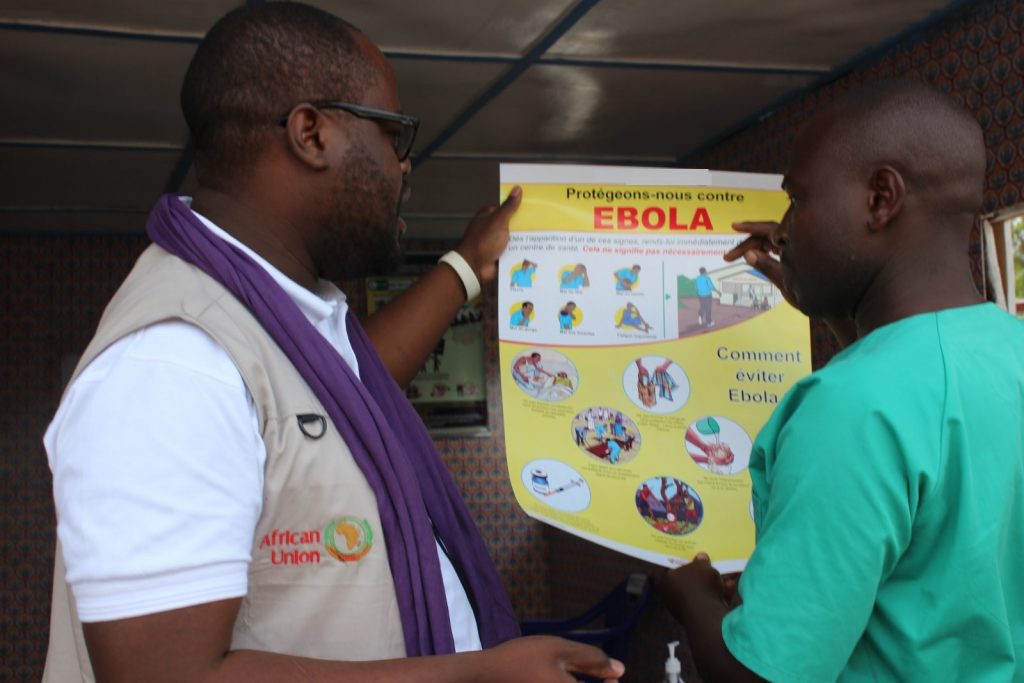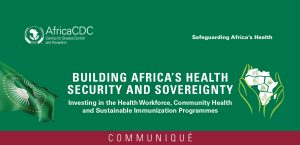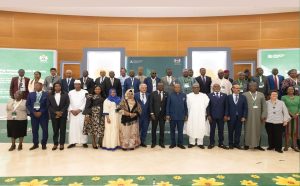ADDIS ABABA, ETHIOPIA – 25 April 2022: The Government of the Democratic Republic of Congo (DRC), through the Ministry of Health (MoH) has declared an outbreak of the Ebola virus disease (EVD) in the Mbandaka Health Zone, Equateur province (bordering the Congo and Ruki Rivers in northwest DRC). This outbreak was confirmed on 23 April 2022, four months after the most recent outbreak which was declared over on 16 December 2021. The current announcement is the third EVD outbreak declared in the Equateur province between 2018 and 2022. Health authorities are yet to confirm if the current case is linked to any of the previous outbreaks in the region.
The most recent case of EVD was detected in a 31-year-old male student, who showed up at a local health facility with persistent fever, headache, fatigue, vomiting, and diarrhoea which began on 05 April 2022. He was then referred to the Wangata Ebola treatment centre (ETC) on 19 April 2022.Following two days of persistent fever and unexplained bleeding, he was pronounced dead on 21 April 2022. Laboratory results for the patient from both the Wangata ETC and the national public health laboratory (INRB) tested positive for EVD. Authorities have confirmed that the patient had received an EVD vaccine in 2020.
The MoH in DRC is currently conducting an in-depth case investigation and has listed 74 contacts of the deceased with disinfection of households and local health facilities is ongoing. Overall, the risk of spread of the outbreak is high, demanding rapid implementation of public health measures, including thorough contact tracing and follow up.
The Africa Centers for Disease Control and Prevention (Africa CDC) team in Kinshasa is currently working with the National Coordination mechanism; and preparing to deploy a team of experts to the affected health zone – including epidemiologists, infection prevention and control and laboratory experts. The team will conduct outbreak investigation, support response efforts and conduct a rapid needs assessment. Africa CDC will remain on-standby to deploy more resources and provide technical assistance until the outbreak is controlled. The Africa CDC is requesting neighboring health zones, provinces, and member states to remain on high alert and vigilant to prepare for and detect and respond to potential spread of the outbreak. Activities should include mapping out population movement patterns to identify potential crossing points, setting-up screening posts,conducting health screenings for travelers, and implementing public health measures, including temperature monitoring, and infection prevention and control (IPC) interventions, as well as sharing health information..
EVD is a zoonotic viral haemorrhagic fever that affects both human and non-human primates (such as monkeys, gorillas, and chimpanzees). The virus can be transmitted to people from wild animals infected with the Ebola virus such as fruit bats, porcupines, and non-human primates. Secondary transmission may occur through direct contact with the blood, secretions, organs, or other bodily fluids of infected people, and from surfaces and materials contaminated with these fluids. The incubation period for EVD is from two to twenty-one days, and cases are not infectious up until they develop symptoms. Clinical symptoms include fever, fatigue, muscle pain, headache, vomiting, diarrhoea, and unexplained bleeding or bruising with an average case fatality rate of 50%.
END
Media inquiries:
Dr. Merawi Aragaw, Ag. Head, Division of Health Emergency Preparedness and Response, Africa CDC | Email: merawia@africa-union.org
G. Nekerwon Gweh, Communication Officer, Division of Policy, Health Diplomacy and Communication; Africa CDC | Tel: +251 945 502 310 | Email: GwehN@africa-union.org
About the African Union
The African Union spearheads Africa’s development and integration in close collaboration with African Union Member States, the Regional Economic Communities and African citizens. AU Vision: to accelerate progress towards an integrated, prosperous and inclusive Africa, at peace with itself, playing a dynamic role in the continental and global arena, effectively driven by an accountable, efficient and responsive Commission. Learn more at: http://www.au.int/en
About Africa CDC
Africa CDC is the authorized health agency of the African Union which supports Member States in their efforts to strengthen health systems and improve surveillance, emergency response, prevention and control of diseases. Learn more at: https://africacdc.org
For further information:
Directorate of Information and Communication | African Union Commission I E-mail: DIC@africa-union.org I Website: www.au.int I Addis Ababa | Ethiopia.
Follow us
Face book: https://www.facebook.com/AfricanUnionCommission
Twitter: https://twitter.com/_AfricanUnion
YouTube: https://www.youtube.com/AUCommission Learn more at: http://www.au.int







